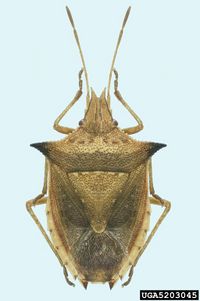Difference between revisions of "Dichelops melacanthus"
From Pestinfo-Wiki
| Line 4: | Line 4: | ||
<font color="#800000">'''''Dichelops melacanthus'''''</font> Dallas, 1851 | <font color="#800000">'''''Dichelops melacanthus'''''</font> Dallas, 1851 | ||
| − | This green-belly stink bug is found in South and Central America. It has been regarded as rare before 1990, but has become a serious pest of soybean, maize, and wheat crops, mainly in Brazil and Argentina. Other types of crops may also be attacked. The adults and nymphs feed on seedlings and on the developing pods, ears and | + | This green-belly stink bug is found in South and Central America. It has been regarded as rare before 1990, but has become a serious pest of soybean, maize, and wheat crops, mainly in Brazil and Argentina. Other types of crops may also be attacked. The adults and nymphs feed on seedlings and on the developing pods, ears and seed heads of their host plants. In a laboratory choice test, immature soybean pods were the preferred food ([[Neotropical Entomology (2008) 37, 353-360|Chocorosqui & Panizzi, 2008]]). |
See also the closely related ''[[Dichelops furcatus]]'', another green-belly stink bug. | See also the closely related ''[[Dichelops furcatus]]'', another green-belly stink bug. | ||
Revision as of 10:50, 27 July 2019
| Literature database |
|---|
| 26 articles sorted by: |
| • year (recent ones first) |
| • research topics |
| • countries/regions |
| • host plants |
| • list of natural enemies |

Dichelops melacanthus (click on image to enlarge it)
Author(s): Natasha Wright, Florida Department of Agriculture and Consumer Services
Source: IPM Images
Author(s): Natasha Wright, Florida Department of Agriculture and Consumer Services
Source: IPM Images
Dichelops melacanthus Dallas, 1851
This green-belly stink bug is found in South and Central America. It has been regarded as rare before 1990, but has become a serious pest of soybean, maize, and wheat crops, mainly in Brazil and Argentina. Other types of crops may also be attacked. The adults and nymphs feed on seedlings and on the developing pods, ears and seed heads of their host plants. In a laboratory choice test, immature soybean pods were the preferred food (Chocorosqui & Panizzi, 2008).
See also the closely related Dichelops furcatus, another green-belly stink bug.
| Vernacular names | |
|---|---|
| • English: | Green-belly stink bug |
| • Português: | percevejo-barriga-verde |